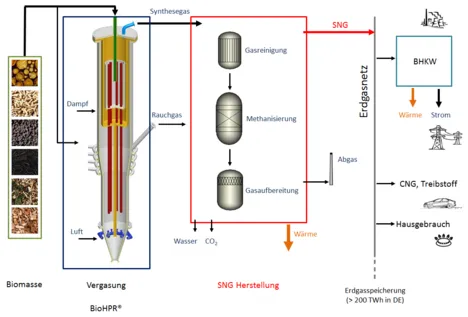SNG
"Decentralized production of synthetic natural gas (SNG) out of the purified producer gas of an allothermally operated biomass gasifier."
Motivation
The energetic use of biomass is an almost CO2-neutral opportunity to reduce the world’s dependency on fossil energy carriers, natural oil and coal. As of today, however, biomass is mainly used thermally (in heating plants and residential fireplaces, for example). Compared to fossil energy carriers, The entirely volume-specific energy density allows only decentralized application, and limits the size of the facility (about 20 MWel), as well as the possible electrical efficiency (about 30%).
An alternative to the direct generation of biomass through combustion is the production of synthetic natural gas (SNG=Substitute Natural Gas or Synthetic Natural Gas). The first step in such a process is the thermochemical gasification of the biomass to a synthetic gas, out of which a gas similar to natural gas can be created, through a gas treatment and methanation step. This gas can then be integrated into an existing natural gas grid.
The advantages of a process chain such as this one lie in the potential for high efficiency, the possibility of energy storage, the use of a well established natural gas grid, and the expansion of the application spectrum of biomass.
Project Objectives
The goal of the project is the development and demonstration of a procedure for the treatment and methanation of product gas from a biomass gasifier. The processed gas (synthetic natural gas, SNG) should meet the criteria for integration into the natural gas grid. Highest fuel utilization rates are reachable, when the heating in district and local heating networks can be used for heating purposes or in industry processes for steam production. This way, heat and electricity can be utilized with the lowest possible emission rates, on things such as particulate matter.
For gasification, a commercially available allothermic biomass-fluidized bed gasifier with a fuel capacity of 500 kW will be used, the so-called Heatpipe-Reformer (HPR500). This gasification process was developed in the last few years at the institute for energy systems (LES), and before that at the institute that preceded it, the institute for thermal power plants (LTK).
As the basis for this project, a laboratory facility at the institute for energy systems, and an HPR of the company “hs Energieanlagen GmbH” are being used. The development of the procedure is being held at the institute, and the presentation of the procedure is to be held at the 500 kW gasifier in Neufahrn/Freising.
Project Partners: hs energieanlagen GmbH
More information:
Contact Person: Sebastian Fendt
Project Website: http://www.energetische-biomassenutzung.de






